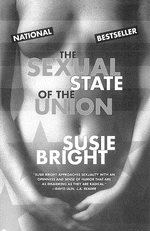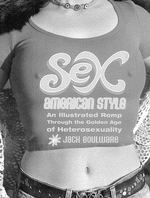
Perhaps Today's Oh-So-Serious Sexual Crusaders Could Learn Something From The Sleazy '70s.
By James DiGiovanna
The Sexual State of the Union, by Susie Bright (Touchstone/Simon
and Schuster). Paper, $12.
Sex American Style, by Jack Boulware (Feral House).
Paper, $16.95.
TWO NEW BOOKS purport to sum up the sexual zeitgeist of
two eras of American erotic history. Sex American Style,
by Jack Boulware, is a compendium of "sexual revolution"-era
smut, jiggle TV, sex advice manuals and various media outbreaks
of pre-AIDS eroticism which paints the '70s as a time of joyfully
innocent naughtiness. Susie Bright's The Sexual State of the
Union, a bestseller in hardcover and just out in paperback,
tries to fulfill the grand promise of its title by warning us
that today the anti-sex police are everywhere, and by providing
political excuses for our licentious discretions.
 Bright's prose has matured from the smarmy-fun cuteness of her
"On Our Backs" sex advice column to a fluid and transparent
media for conveying her hyper-politicized anger. While I find
myself agreeing with the vast majority of her positions, the problem
is that they've become trite and repetitive exercises in pedantry.
Her annoying use of words in all-caps and her fuming-mad style
all are in service of her charge that sexual expression is more
endangered than ever.
Bright's prose has matured from the smarmy-fun cuteness of her
"On Our Backs" sex advice column to a fluid and transparent
media for conveying her hyper-politicized anger. While I find
myself agreeing with the vast majority of her positions, the problem
is that they've become trite and repetitive exercises in pedantry.
Her annoying use of words in all-caps and her fuming-mad style
all are in service of her charge that sexual expression is more
endangered than ever.
She gives as an example the recent spate of hysteria over internet
porn. What fails to come through, though, is that no attempt at
quashing this turgid miasma of nudity and unnatural positions
has had any effect. If anything, there's quantitatively more porn
on the net now than there was before the instantion of the Decency
Act. If Bright were content to claim that the government has no
compelling interest in limiting our right to look at pictures
of people doing it with horses, she would at least be on honest
ground, though the point has been made many times before by those
more astute at putting together convincing arguments. Instead,
she goes so far as to make the disingenuous claim that there isn't
that much porn on the internet, and everyone she asked was unable
to find any, and what they did find wasn't so bad. I'm pretty
sure the average 14-year-old with a computer knows where to go
to find stuff that would make your skin crawl, and I doubt that
Bright doesn't know that.
 The biggest problem with The Sexual State of The Union
is that, while it accuses the MacKinnons and Steinems of the world
with taking all the fun out of fucking, State of the Union
itself is completely devoid of good times. Every act must be politically
justified, every sex-positive statement put forward as a blow
against the sex-negative straw-women.
The biggest problem with The Sexual State of The Union
is that, while it accuses the MacKinnons and Steinems of the world
with taking all the fun out of fucking, State of the Union
itself is completely devoid of good times. Every act must be politically
justified, every sex-positive statement put forward as a blow
against the sex-negative straw-women.
It seems that the naïve exuberance of the '70s sexual explosion
may have been more effectively political than the agrumentative
sophistication of the '90s. Whatever the importance of the rear-guard
action being fought by Bright (and it is important, although perhaps
not so grave as she thinks), the real battle for the right to
be dirty was fought and won during the period eulogized in Boulware's
Sex American Style. The fact that even a family paper like
the Tucson Weekly is flooded with ads for strip clubs,
sex shops and singles-seeking-same shows how far the porn wars
have taken us.
Perhaps it's because, as Boulware has it, the sudden permissiveness
was bred out of a mad desire for fun. It's interesting in looking
at all the book covers, movie posters, and excerpts from '70s
TV programming that are collected in Sex American Style
to see just how silly all the unfettered naked fun times look
now.
Really, that's the point of Boulware's book, and it's probably
a lot easier to have fun when one is looking backward than when
one is immersed in the battles of the moment, as Bright is. Still,
both books share a loose organization that is beneficial to the
'70s sex soup that Boulware wishes to present, but makes Bright
look sloppy.
 While Sex American Style can jump in a few highly amusing
pages from the history of John Holmes' dick to naked art theater
to racy album covers without diminishing its overarching motif,
Bright's tendency to change topics within her essays makes her
look intellectually weak. One of the pieces collected in State
of the Union, putatively on sexual violence, jumps in its
10 pages from 1940s sex crimes to milk carton kids to anti-gay
hysteria to violence against women to female sexual domination
to Theodor Kaczynsky. Somehow it's all the fault of the right-wing,
anti-sex "born again virgins." Whatever.
While Sex American Style can jump in a few highly amusing
pages from the history of John Holmes' dick to naked art theater
to racy album covers without diminishing its overarching motif,
Bright's tendency to change topics within her essays makes her
look intellectually weak. One of the pieces collected in State
of the Union, putatively on sexual violence, jumps in its
10 pages from 1940s sex crimes to milk carton kids to anti-gay
hysteria to violence against women to female sexual domination
to Theodor Kaczynsky. Somehow it's all the fault of the right-wing,
anti-sex "born again virgins." Whatever.
This would be funny if it weren't for the fact that Bright seems
so on-the-money in asserting that sexual expression must be tolerated,
and that a diversity of such expressions is not a danger to the
country, but rather a source of individual strength. Her call
for a feminism which strongly asserts the pleasures of heterosexual
sex is deeply felt by many women as an important desiderata. Since
she's become something of a leader in the movement for a pro-sex
feminism, it's disturbing that her arguments could be pointed
to by those opposed to her as the messy melange that they are.
And perhaps if she took her own advice, and stopped seeing all
sexual activity as a political battleground, and started seeing
it as a place for fun, exploration, and general naughtiness, then
she could actively recapture some of the spirit of the sex-mad
'70s that Boulware has cleverly catalogued, and which Bright claims
as a source for her own ideas and attitudes.

|





